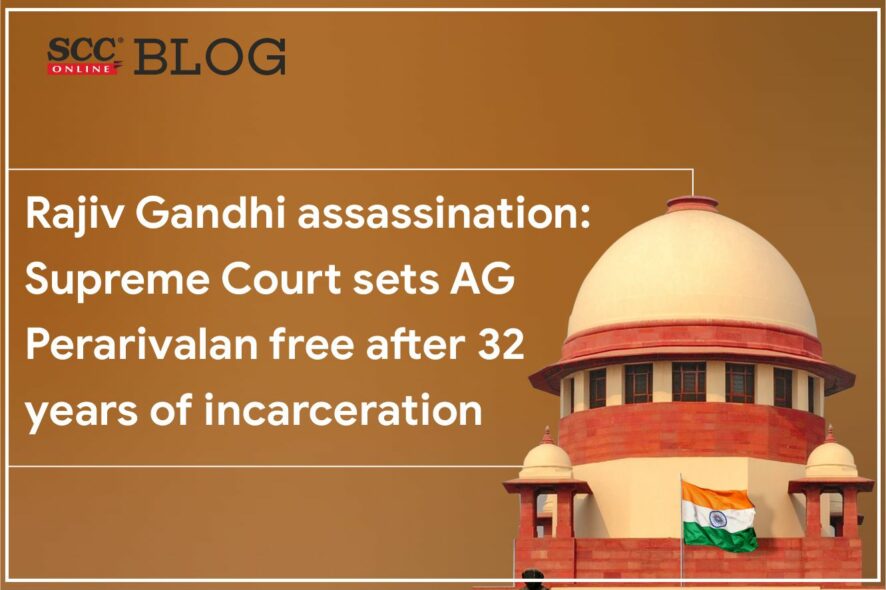Supreme Court: In a big relief for A.G. Perarivalan, convicted for assassination of former Prime Minister Rajiv Gandhi, the 3-judge bench of L. Nageswara Rao*, BR Gavai and AS Bopanna, JJ has directed his release after being incarcerated for 32 years.
Release of Perarivalan
Perarivalan was convicted for offences under IPC, the Arms Act, 1951, the Explosive Substances Act, 1908, the Passport Act, 1967, the Foreigners Act, 1946, the Wireless Telegraphy Act, 1933 and the Terrorist and Disruptive Activities (Prevention) Act, 1987. He was sentenced to death by the designated TADA Court. The Supreme Court, however, commuted the death sentence to imprisonment for life on 18.02.2014.
Perarivalan’s petition under Article 161 remained pending for two and a half years following the recommendation of the State Cabinet for remission of his sentence and continued to remain pending for over a year since the reference by the Governor. This was the main reason that weighed in with the Supreme Court while ordering his release.
Apart from this, the Court also noticed that Perarivalan was 19 years of age at the time of his arrest and has been incarcerated for 32 years, out of which he has spent 16 years on the death row and 29 years in solitary confinement. There has been no complaint relating to his conduct in jail. On the two occasions that Perarivalan had been released on parole, there had been no complaint regarding his conduct or breach of any condition of release. Medical records, filed on behalf of Perarivalan, show that he is suffering from chronic ailments. Apart from his good behaviour in jail, Perarivalan has also educated himself and successfully completed his +2 exams, an undergraduate degree, a postgraduate degree, a diploma and eight certification courses.
The Court, hence, held,
“Given that his petition under Article 161 remained pending for two and a half years following the recommendation of the State Cabinet for remission of his sentence and continues to remain pending for over a year since the reference by the Governor, we do not consider it appropriate to remand the matter for the Governor’s consideration. In the absence of any other disqualification and in the exceptional facts and circumstances of this case, in exercise of our power under Article 142 of the Constitution, we direct that the appellant is deemed to have served the sentence in connection with Crime No. 329 of 1991. The appellant, who is on bail, is set at liberty forthwith.”
Governor’s power to refer a recommendation made by the State Cabinet to the President of India
The advice of the State Cabinet is binding on the Governor in matters relating to commutation / remission of sentences under Article 161. No provision under the Constitution has been pointed out to us nor any satisfactory response tendered as to the source of the Governor’s power to refer a recommendation made by the State Cabinet to the President of India. In the instant case, the Governor ought not to have sent the recommendation made by the State Cabinet to the President of India. Such action is contrary to the constitutional scheme elaborated above.
In the case at hand, recommendation made by the State Cabinet was on 09.09.2018, which remained pending before the Governor for almost two and a half years without a decision being taken. It was only when the Supreme Court started enquiring about the reason for the decision being delayed, the Governor forwarded the recommendation made by the State Government for remission of Perarivalan’s sentence to the President of India.
Hence, being fully conscious of the immunity of the Governor under the Constitution with respect to the exercise and performance of the powers and duties of his office or for any act done or purported to be done by him in the exercise and performance of such powers and duties, the Court observed that non-exercise of the power under Article 161 is not immune from judicial review.
[AG Perarivalan v. State, 2022 SCC OnLine SC 635, decided on 18.05.2022]
*Judgment by: Justice L. Nageswara Rao
For Perarivalan: Senior Advocate Gopal Sankaranarayanan






